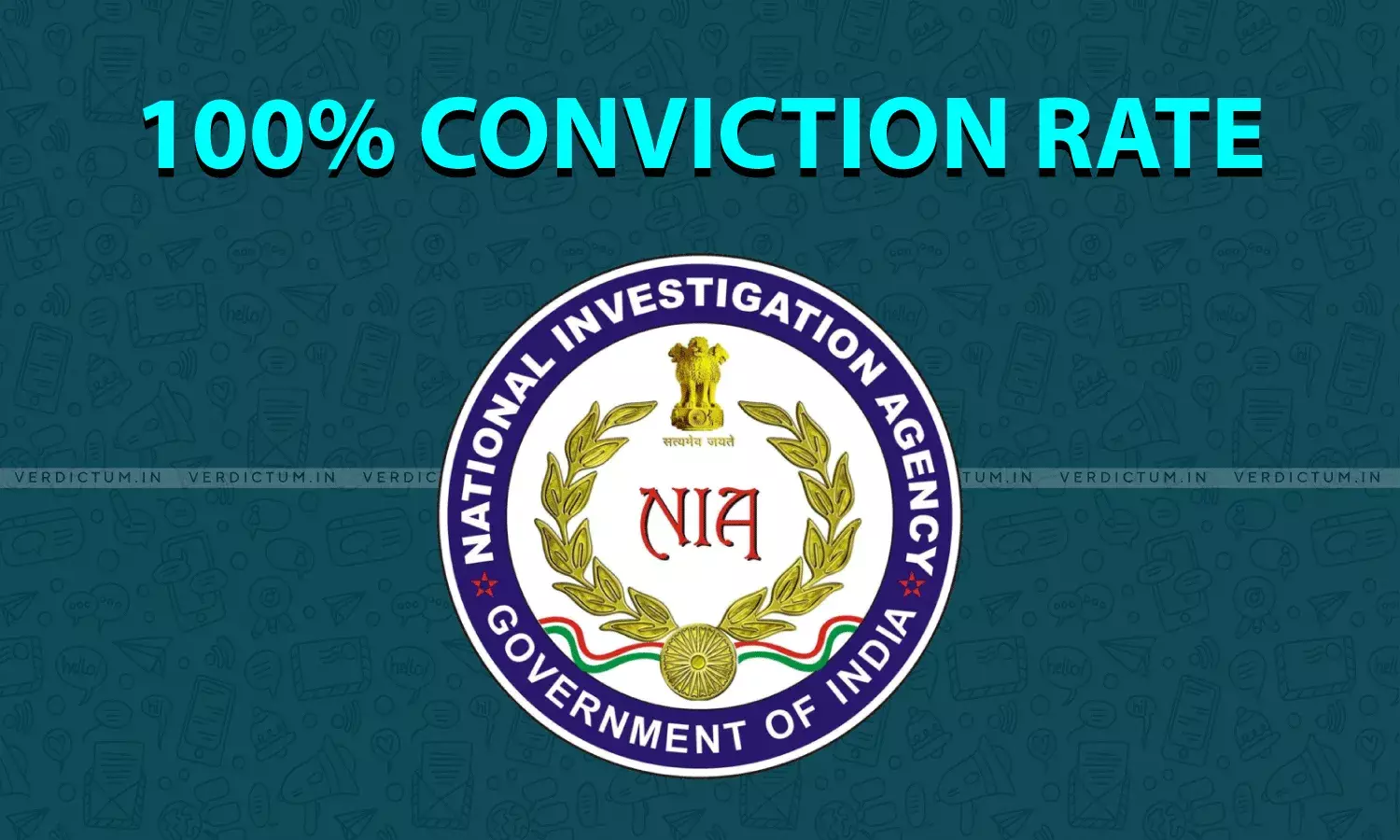NIA Achieves 100% Conviction Rate In 2024 With Conviction Of 68 Accused Across 25 Cases

The National Investigation Agency (NIA) has set a record in 2024 by achieving a 100% conviction rate, securing convictions of 68 accused in 25 cases. This unprecedented milestone underscores the agency's dedication to delivering justice and bolstering national security.
According to an official press release dated December 31, 2024, this achievement is a result of rigorous investigations and meticulous legal strategies, further enhancing the NIA’s reputation as one of India’s most effective investigative bodies.
The NIA said, “The successful investigation of several important/high-profile cases and a strong focus on tackling Left Wing Extremism (LWE) marked a year of many highs for the National Investigation Agency (NIA), which delivered a record 100 per cent conviction rate for 2024.”
“Arms seizure emerged as a key milestone against attempts by anti-national forces to unleash violence in the country. Cases of weapons recovery and seizure were reported from across the country, including Jammu, Jaipur, Ranchi, Patna, and Chandigarh,” the press release said.
In 2024, the NIA registered 80 cases, arresting 210 accused across multiple crime categories. Left Wing Extremism (LWE) and North East insurgency topped the list, with 28 and 18 cases, respectively. Other categories included seven Jammu and Kashmir Jihadi cases, six explosive substance cases, five human trafficking cases, and several others involving Khalistan, ISIS, gangsters, and cyber terrorism.
The agency also filed chargesheets against 408 accused and attached 137 properties worth Rs. 19.57 crore in efforts to dismantle terrorist and criminal networks. Of the 210 arrests, LWE-related activities accounted for 69 arrests, with 28 cases registered and 12 chargesheets filed against 64 accused.
In the North East, 15 arrests were made, including five individuals linked to the banned ULFA (I) for issuing an Independence Day boycott call and planting IEDs, which caused panic in Assam.
A significant crackdown on Khalistani terrorist networks saw 14 arrests and 101 searches. Among key cases, the NIA chargesheeted Babbar Khalsa International (BKI) chief Wadhawa Singh alias Babbar, and five others in the murder of VHP leader Vikas Bagga. The agency also filed chargesheets against Khalistan Terrorist Force (KTF) members Manpreet Singh alias Peeta and Mandeep Singh after their deportation from the Philippines.
“The notable among these was the seizure, in Jammu, of arms/ammunition and other incriminating materials from a car driver working as an overground worker (OGW) of the banned Hizbul Mujahideen (HM) militant outfit. As many as 2 hand grenades, 34, 9 mm pistol rounds, 1 Chinese pistol, 1 Turkish pistol, 20 Chinese pistol rounds and 1 pistol silencer were recovered in this case....The arrest of 11 ISIS Jihadis, 5 J&K Jihadis and 24 other Jihadis marked another major step forward for the agency,” the release said.
The NIA secured the conviction of four terrorists, including Kulwinderjeet Singh alias Khanpuria, a key conspirator in multiple terror attacks, including a grenade attack at Delhi’s Red Fort.
With 662 searches conducted and a focus on cracking terrorism and gangster-related cases, the NIA has demonstrated agile and effective responses to complex investigations. “NIA coordinated closely with them throughout the year, working in a spirit of teamwork and sharing information on a continuous basis to crack various important cases with speed and alacrity. As part of its efforts to enhance the capacity of the state police forces, NIA also engaged in their capacity building, providing training to 1,678 state police officials through 11 training programmes/courses in 2024. At the same time, given the growing scale and magnitude of major terror-related and other serious crimes with the potential to disrupt India’s peace and harmony, NIA made significant efforts during the year to strengthen its own capacities. The establishment of two new exclusive NIA courts, one each in Jammu and Ranchi, was an important step in this direction. NIA also released a handbook on UA(P)A investigations to bring standardisation into the probing of terror cases,” the press release said.
In a related news, in November 2024, the Supreme Court, while hearing former West Bengal Minister Partha Chatterjee's petition seeking bail in a cash-for-jobs alleged scam case, had remarked that it would have understood the Enforcement Directorate's opposition if it had a higher conviction rate.
During the course of the hearing, Justice Bhuyan asked Additional Solicitor General (ASG) S.V. Raju, who was appearing for ED, "What is your conviction rate? If it is 60-70 percent, we can understand your opposition. It is very poor." In response, Raju urged the Court must see ED matters on a case-to-case basis, adding that on Chatterjee, the agency has a "strong prima facie case" and that "this is not a case where there is going to be no conviction." To Raju's statement attributing guilt, Justice Kant retorted, "Mr. Raju, these are all speculative things. You may be ultimately right. But we can't say yes; we can't say no. This will depend upon the nature of evidence and its appreciation by the Trial Court."
Earlier, in October 2024, the Apex Court had told the CBI that it has a very low conviction rate. The Bench had commented that the conviction rate in CBI cases is "very low," which emboldens white-collar criminals. The Bench also observed that in CBI cases, the list of witnesses is usually large. The Court had made the observation while granting bail to businessman Amandeep Singh Dhall in a case registered by the Central Bureau of Investigation (CBI) relating to the Delhi excise policy case.

